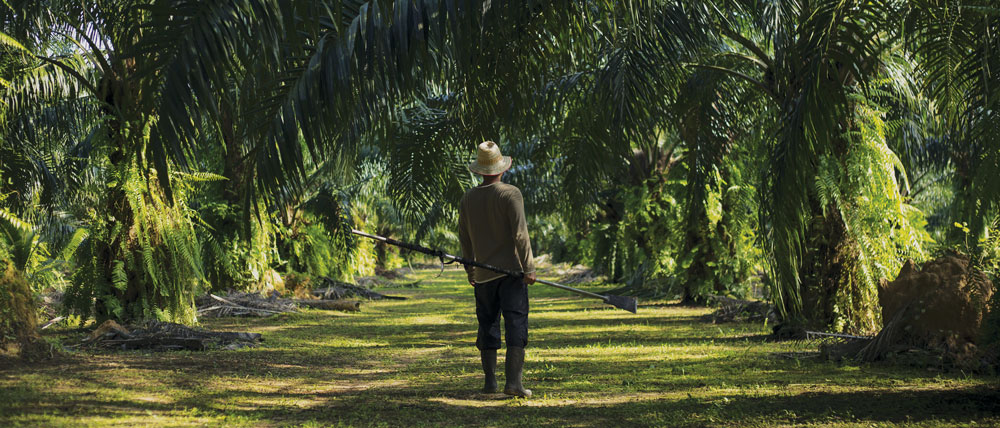



For the Malaysian commodities sector
October, 2020 in Issue 3 - 2020, Cover Story
The Hon. Dato’ Dr Khairuddin Aman Razali was appointed Malaysia’s Minister of Plantation Industries and Commodities in March, following the takeover of the government by Perikatan Nasional (PN) in February. In an interview, he highlights strategies to cope with ongoing issues in the palm oil sector, including challenges being thrown up by the Covid-19 pandemic.
Covid-19 has caused widespread suffering for oil palm smallholders, whose income has fallen due to the lower price of palm oil. How is your Ministry helping them?
Dato’ Dr Khairuddin Aman Razali: Smallholders have always been an important stakeholder in our palm oil industry. Over the years, the government has introduced various initiatives to help them succeed and improve their livelihood. To ease the impact of poor returns due to Covid-19, the government has allocated RM350 million in microcredit financing via Agrobank, at an interest rate of 3.5%, to help agropreneurs. This serves as another option for smallholders to finance plantation activities.
Currently, the Oil Palm Smallholder Replanting Financing Scheme and Oil Palm Smallholder Agricultural Input Scheme already assist smallholders with replanting old and unproductive oil palm trees with high yielding seedlings; in the long term, this will improve the yield and generate higher income.
Apart from that, the government is actively encouraging smallholders to participate in the Sustainable Oil Palm Planters Cooperative (KPSM). This aims to increase income through higher productivity via the implementation of Good Agricultural Practices and auxiliary activities. The main activity of the KPSM is the establishment of weighing centres to purchase fresh fruit bunches (FFB) from smallholders.
Under the 11th Malaysia Plan, the government has provided an incentive of RM200,000 per KPSM to build weighing centres. To strengthen capacity in FFB trading, the government – through the Malaysian Palm Oil Board (MPOB) – has created a revolving fund for selected high performing KPSM. This serves as working capital support to offer a better price for FFB than that offered by middlemen dealers.
Through the Ministry of Agriculture and Food Industry, and working with MPOB, the government has launched the Cash Crop Programme for independent oil palm smallholders in the B40 [low-income] category; each participant gets RM3,000 to plant bananas and RM7,000 to plant pineapples. Additionally, an incentive scheme helps smallholders to venture into rearing livestock, such as cattle and goats, for extra income especially during a downturn in palm oil prices.
One main issue in the industry is the shortage of plantation workers. How do you see this impacting the industry, especially during the Covid-19 pandemic?
The labour shortage has affected productivity in all sectors. In the oil palm industry, there are vacancies in harvesting operations for about 36,000 people around the country. It is disheartening that some are reluctant to work in estates, and we have had no choice but to get in foreign workers. The problem was felt more acutely during the Covid-19 lockdown period earlier this year.
However, I look at this from a positive angle. The pandemic has made us realise how much we have been dependent on foreign workers. We need to woo more Malaysians to join the plantation sector. With many being laid off due to the economic impact of Covid-19, it would be good for them to seek employment in the plantation sector. We have implemented a minimum wage as stipulated by law. Some main industry players are currently paying double the amount, in addition to providing free accommodation and other perks. This information needs to be promoted more effectively to attract locals.
In trying to draw in the best workers, my Ministry has set up a special task force on plantation labour to see how best we can assist unemployed locals and match them with specific needs in the industry. The MPOB, meanwhile, remains very active in research and development to mechanise plantation activities. I truly believe that, through sheer determination and cooperation with all involved, Malaysia can address the shortage of workers. Further information can be obtained from MPOA and MPOB.
Since the PN took over the government, diplomatic ties with India have improved. Does this warmer relationship have any bearing on India’s intake of Malaysian palm oil?
I am glad that diplomatic ties between India and Malaysia have improved. The Right Honourable Prime Minister himself met with the Indian Envoy stationed in Kuala Lumpur. The improvement is evident in the increase in bilateral trade. We in the Ministry have also worked hard toward this.
The latest figures from the Department of Statistics show an increase in the value of exports of palm oil and its products by 544% in June (valued at RM633.5 million), compared to May (RM98.3 million). In June, India imported 246,045 tonnes of palm oil, compared to 10,806 tonnes in March – a 23-fold increase. We hope the trend will continue as the year progresses. My Ministry will work hard to ensure exports rise and to explore new markets.
Recently, I had a virtual discussion with H.E Singireddy Niranjan Redy, Minister of Agricultural, Co-operation, Marketing, Food & Civil Supplies, and Consumer Affairs in Telangana, India. I conveyed our hope that the Indian government will import more palm oil and palm-based products.
Mr Redy sought Malaysia’s expertise in oil palm cultivation to expand plantations in Telangana. I told him that the Malaysian government is willing to provide such expertise and that I hope India will provide sandalwood seedlings in exchange. Telangana is also impressed by our enthusiasm for the bamboo sector and has requested collaboration and possible investment by Malaysian companies.
Apart from that, my Secretary-General and his entourage paid a courtesy call on the High Commissioner of India to Malaysia. Their discussions focused on further improvement to diplomatic and trade relationships, especially in the commodities sector.
The European market has been hostile to palm oil, over alleged issues of sustainability and health. This shows that we cannot rely on a particular market to sell our palm oil. What do you have in mind to address this?
Palm oil has long been targeted because it is the most efficient oil-bearing crop in terms of production, land utilisation, pricing and versatility. This explains why the European Union (EU), as a main producer of rapeseed oil, is hostile to palm oil as a competing product. I am sad to note that the EU is reluctant to take into account our efforts toward sustainable production of palm oil, as well as communication with its parliamentarians and government officials. They continue to treat palm oil unfairly, so Malaysia has had no option but to seek action by the World Trade Organisation.
I agree that we cannot put all our eggs in one basket. We can target markets in the Middle East, Africa and Central Asia. They have a lot of potential that we can capitalise on, such as rising consumption from a growth in population.
Other than the Covid-19 pandemic, what factors have affected the demand for and price of Malaysian palm oil this year?
Firstly, many regard the trade war between the US and China as detrimental to the global economy due to the uncertainties created. When China agreed to buy more agricultural products from the US as part of their first trade deal signed in January, we anticipated that Chinese demand for Malaysian palm oil would be badly hit because of direct competition from soybean oil.
Indeed, our exports to China decreased by almost 16% in the first quarter of 2020, compared to the same period a year before. However, as tensions escalated between the two superpowers, we saw higher Chinese imports of our palm oil in the second quarter. It is hard to predict how the trade war will play out. We will monitor the situation closely and assess its impact on palm oil from time to time.
Secondly, restrictions on global and local travel to curtail Covid-19 have impacted the demand for biodiesel. Malaysia has delayed the implementation of its B20 programme until September for Sarawak and early next year for Sabah. As countries start to open their borders, I expect the demand for biodiesel to improve.
Thirdly, the breach in diplomatic ties between Malaysia and India did not help the palm oil industry. We lost quite a bit of exports during that period because India is our biggest buyer. But I believe we have mended this, as mentioned earlier.
Fourthly, we face continuous competition with other palm oil producers that could offer discounted prices. In dealing with this, my Ministry and its agencies have worked hard to maintain relationships with current buyers and to promote Malaysian palm oil to new ones.

The Malaysian Sustainable Palm Oil (MSPO) certification scheme is a strategic approach by the government to enhance the competitiveness and marketability of Malaysian palm oil in the global market. What is the progress of the scheme, given the challenges posed by the Covid-19 pandemic?
I have been involved in promoting the MSPO on the ground. At the events I attended, I sensed that awareness among smallholders with regard to the scheme and the necessity to get it implemented across the board has improved. They now understand why the government is serious about the scheme and why certification is mandatory. As at Aug 25, MSPO certification had been completed for about 86% or 5.1 million ha of the oil palm planted area.
While I am of course proud of this achievement, there is still much work to be done, particularly when it comes to certifying the independent smallholders. Collectively, 293,585 oil palm smallholders have received the MSPO certification. However, the majority are organised smallholders who are managed and certified under agencies such as FELDA and FELCRA.
We have only managed to certify 24.3% of the 986,331 ha of oil palm planted by independent smallholders. We will help to get them on board the MSPO through programmes such as Sustainable Palm Oil Clusters, to meet our target of 100% compliance with the scheme.
Recently, there was discussion that bamboo will replace palm oil as Malaysia’s top commodity. Was this a misunderstanding?
The debate on this in the Parliament was wrongly interpreted. At no point did I say that bamboo would replace palm oil as our main commodity. Our intention was merely to explore the economic viability of bamboo as an alternative commodity. The preliminary studies conducted locally have indicated that bamboo has the economic potential to generate lucrative income.
I would like to assure all palm oil stakeholders that the government will protect the interests of the industry and strengthen it. Among the measures being undertaken are application of the latest technology in the upstream sector; expansion of markets; diversification of value-added products; and studies that focus on the benefits of palm oil.
Can you tell us more about the ‘Sawit Anugerah Tuhan’ (‘Palm oil is God’s gift’) slogan that you have introduced?
When I was appointed Minister, I started to learn more about palm oil. I realised that palm oil, unlike competing oils, has many good qualities that warrant its status as the world’s leading vegetable oil. For example, its semi-solid characteristic at normal room temperature provides an effective solution to trans fats. It is highly versatile for various food applications. Palm oil is also nutritious and healthful as it is rich in potent antioxidants, Vitamin E and beta-carotene.
On the sustainability front, the oil palm is the most productive of oil crops, requiring the least acreage of land and inputs to produce the same tonnage of oil. There is also abundant and uninterrupted supply of palm oil for global consumption all year round. As such, I concluded that palm oil is a gift from God.
The slogan is an epitome of a product that has many attributes. It does not demean or belittle other commodities; it is an acknowledgement that palm oil is truly special. It is found in six out of 10 food and non-food products, and displayed on supermarket shelves in 160 countries. Can other commodities top that?
Finally, what are your wishes for Malaysian palm oil and the industry going forward?
Malaysia is one of the few net exporters of oils and fats. Therefore, it has a big role to play in helping to meet global food security. However, palm oil production is being linked to deforestation, carbon emissions, destruction of wildlife habitats, forced labour, violations of the rights of indigenous peoples, and food contamination. These claims are detrimental to the industry and can disrupt the global market access of palm oil.
Moving forward, I would like to see these issues being resolved for the benefit of all stakeholders. Here, we are addressing them through implementation of the MSPO standard; improved on-the-ground practices; and to some extent, branding. We also need to be more aggressive and effective in communications, and to work with concerned parties toward a common objective – the acceptance of sustainably produced palm oil.
